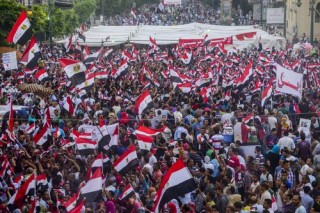How geopolitical developments are changing the Middle East
The current changes in international geopolitics makes achieving unity between Egypt and the rest of the Arab countries an inevitable necessity. Ahmad Abdul-Rahman discusses the issues.
When we talk about the importance of a strong Arab and regional order, we are talking about the need to restore the Arab ability to maintain regional and strategic balance. This is after many years in which the region has faced geopolitical changes that have threatened some countries, while in others, regimes have been overthrown.
The reality and what has happened over two decades, proves the magnitude of the danger the region has faced. Whether you agree or deny the existence of plans for the fragmentation and re-partition of the Middle East, the latter is true.This might explain the emergence of ISIS, which has coincided with the rise of extremist organisations across the region. ISIS appeared simultaneously with movements that initially had mass followings, but with time yielded other facts, such as the fact that these movements were used as a way to achieve power). Egypt was subjected to terrorist attacks, which have dovetailed with the rise of ISIS in the Levant and Iraq, and the declaration of the alleged caliphate under the leadership of Abu Bakr al-Baghdadi.
Abu Bakr al-Baghdadi, born Ibrahim Awad Ibrahim Ali al-Badri al-Samarrai, was an Iraqi terrorist and the leader of the Islamic State of Iraq and the Levant from 2014 until his death in 2019. When Egypt confronted ISIS, the government was aware that terrorism was was not a local threat. However, it is part of overt and covert networks that intersect with the Muslim Brotherhood and other extremist organisations, all of which were supported by huge financial networks. That is why Egypt's war against terrorism has been so extensive and deep.
With the defeat of terrorism in Egypt, the strength of ISIS and its affiliates, declined in more than one country, including Iraq and Libya. Egypt and its president Abdel Fattah El-Sisi have been keen to deal with terrorism and its threat. Egypt has been facing a multilateral war, carried out by state proxies and organisations. Only the terrorists have been visible. Egypt has been keen to confront all these threats as well as propaganda campaigns. For the most part, it has been successful in shutting down these terrorists.
These changes come at a time when there is tension between state entities and a rebuilding of international relations. As a result, new economic and political alliances have emerged. Russia has been accused of interfering in the United States, including cyber-attacks. The trade conflict between China and the United States, which reached its climax in the era of former President Donald Trump, is ongoing. At the same time, the United States is withdrawing troops from Iraq and Afghanistan.
Today, accusations continue between Europe and the United States, on one hand and the United States and China on the other. The Russian and United States presidents, Vladimir Putin and Joe Biden respectively, met at their first summit in Geneva to discuss bilateral relations and a number of international issues. They then issued a joint declaration on the launch of a comprehensive bilateral dialogue on strategic stability between the two countries.
All these developments indicate that the major countries are still preoccupied with their interests and goals, even while a new world order is taking shape. That is why the Arab world must be ready to deal with this new reality, including how to achieve its visions and plans. Based on these facts, it is possible to deal with Arab efforts and moves to gather and deal more effectively with with issues than it has done over the past decade.
Some goals, such as reducing tensions and engaging in political solutions and negotiations, have already been achieved in Syria, Iraq and Libya. The governments in these respective countries have seen a significant fall in the number of conflicts. By comparing the situation a year ago in these areas, it is possible to discover the scale of change. The new reality is likely to mean a more stable future after several years of conflict.


Comments